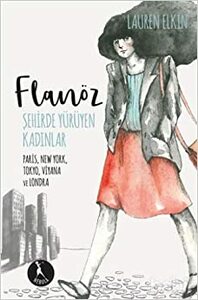Take a photo of a barcode or cover
informative
inspiring
reflective
medium-paced
informative
inspiring
lighthearted
slow-paced
informative
inspiring
reflective
medium-paced
I'm quite disappointed in this book, which delivers something quite different than what it advertises. I had envisioned it as a kind of memoir interspersed with some musings on historical women who struck out on their own in cities. And it is that, partly - but a very minuscule part. Mainly, it is biographical and literary analysis of a bunch of white women who lived in Paris and London and Venice. There's even one agonizingly dull chapter that just summarizes an entire film. All literally information I can pull of Wikipedia, and Elkin doesn't really add any interesting or profound insights, though she does spend a lot of time pretentiously philosophizing. And yet, even with all this navel-gazing, there is little acknowledgment of the different layers of privilege inherent to being a traveler, to walking in a city alone as a woman. And in general, the narrative is uneven, scattered, random. There's no cohesion here.
There were some interesting bits, mainly when Elkin focuses on her own life and experiences, but these bits are few and far between. Furthermore, Elkin is just...boring; she's a very specific subset of privileged white woman, and while she occasionally acknowledges that privilege, she doesn't really seem to do anything with that acknowledgment, so it all feels like posturing. Her experiences all feel bland, rote. The most egregious chapter is when Elkin is in Tokyo and proceeds to criticize the entire city and culture in classic White Woman fashion; it's particularly irritating when Paris is given three entire chapters and is romanticized in a way that is, frankly, naive.
I think, overall, what I did like about the book is that it inspires a sense of wanderlust and evokes in me a new appreciation for urban spaces. It makes me want to travel and explore and walk and observe, though that may just be because we've all been trapped at home for almost a year, so I don't know how much of this wanderlust I can credit the book with. You could probably get away with reading the introduction and maybe the first chapter and you'll have the gist of the book. This would have worked well as an long essay, but as a book it definitely overstays its welcome.
There were some interesting bits, mainly when Elkin focuses on her own life and experiences, but these bits are few and far between. Furthermore, Elkin is just...boring; she's a very specific subset of privileged white woman, and while she occasionally acknowledges that privilege, she doesn't really seem to do anything with that acknowledgment, so it all feels like posturing. Her experiences all feel bland, rote. The most egregious chapter is when Elkin is in Tokyo and proceeds to criticize the entire city and culture in classic White Woman fashion; it's particularly irritating when Paris is given three entire chapters and is romanticized in a way that is, frankly, naive.
I think, overall, what I did like about the book is that it inspires a sense of wanderlust and evokes in me a new appreciation for urban spaces. It makes me want to travel and explore and walk and observe, though that may just be because we've all been trapped at home for almost a year, so I don't know how much of this wanderlust I can credit the book with. You could probably get away with reading the introduction and maybe the first chapter and you'll have the gist of the book. This would have worked well as an long essay, but as a book it definitely overstays its welcome.
A social history that makes you want to book the next flight...anywhere!
'Americans can go anywhere, it turns out, as long as we have the cash'. This is the lesson of this book.
I was bought this book as a graduation present- as a History/ English double major with a strong interest in gender it should have been the perfect gift. But as soon as I started reading this book I felt uneasy.
At first I wasn't sure what it was, sure, there was more biography than I thought, but women inspiring other women is a passion of mine, that couldn't be the problem.
Then came the Tokyo chapter. Cue revelation. Perhaps as a white Australian, culturally linked to the west, geographically linked to Asia, this hypocrisy was more easy to see but, Jesus! Cue nearly 40 pages on how the food was awful, the people were superficial and the city ugly. Cue an American steeped in both the cultural imperialism of her own country and the cultural imperialism of her intellectual home, imperialist-era France, criticising a country for simultaneously not deferring to western values with enough authenticity and failing to make their values sufficiently palatable to someone who spends their life jetting between Tokyo, Paris and New York. An Asian flaneuse? Don't be ridiculous, apparently. Apart from an abortive attempt at understanding the work of Yoko Ono, by omission, Elkin implies they don't exist.
That revealed the problems of this book. The biographical element limited it not to a story of bad ass women who walked their cities but a story of a white middle class woman and the, mostly, white middle class cities she walks- evaluated on how closely they match her understanding about what a city should be. If I ever meet Lauren Elkin I would implore her to read the work of Qiu Miowjin, a fellow francophile, but also a queer Asian woman who experienced her city of Taipei in a way totally antithetical to that which Elkin puts upon a pedestal.
This book could have been amazing! Yet, despite its strength and intelligence, the authorial voice turns the whole thing sour.
I was bought this book as a graduation present- as a History/ English double major with a strong interest in gender it should have been the perfect gift. But as soon as I started reading this book I felt uneasy.
At first I wasn't sure what it was, sure, there was more biography than I thought, but women inspiring other women is a passion of mine, that couldn't be the problem.
Then came the Tokyo chapter. Cue revelation. Perhaps as a white Australian, culturally linked to the west, geographically linked to Asia, this hypocrisy was more easy to see but, Jesus! Cue nearly 40 pages on how the food was awful, the people were superficial and the city ugly. Cue an American steeped in both the cultural imperialism of her own country and the cultural imperialism of her intellectual home, imperialist-era France, criticising a country for simultaneously not deferring to western values with enough authenticity and failing to make their values sufficiently palatable to someone who spends their life jetting between Tokyo, Paris and New York. An Asian flaneuse? Don't be ridiculous, apparently. Apart from an abortive attempt at understanding the work of Yoko Ono, by omission, Elkin implies they don't exist.
That revealed the problems of this book. The biographical element limited it not to a story of bad ass women who walked their cities but a story of a white middle class woman and the, mostly, white middle class cities she walks- evaluated on how closely they match her understanding about what a city should be. If I ever meet Lauren Elkin I would implore her to read the work of Qiu Miowjin, a fellow francophile, but also a queer Asian woman who experienced her city of Taipei in a way totally antithetical to that which Elkin puts upon a pedestal.
This book could have been amazing! Yet, despite its strength and intelligence, the authorial voice turns the whole thing sour.
I think that Elkin is a really talented writer, and what I liked about this book was the atmosphere and mood that it created, that feeling of a woman wandering alone in a big city. However, I could not shake off the feeling that the book was not about enough. It seemed a bit self-involved.
Read my full review here:
https://ivoryowlreviews.blogspot.com/2017/08/4-netgalley-mini-reviews.html
Disclaimer: I was given a copy of this book in exchange for an honest review. I received no additional compensation.
My Review:
I loved this book, but beware that it isn't an "easy" read. The information compiled in Flâneuse is dissertation-level. I read this as an e-book but would like to have a physical copy for future reference. Women walking freely through cities have not always been social acceptable. Elkin delves into the obvious and more complex aspects of the gender divide of what now may be seen as a simple stroll.
https://ivoryowlreviews.blogspot.com/2017/08/4-netgalley-mini-reviews.html
Disclaimer: I was given a copy of this book in exchange for an honest review. I received no additional compensation.
My Review:
I loved this book, but beware that it isn't an "easy" read. The information compiled in Flâneuse is dissertation-level. I read this as an e-book but would like to have a physical copy for future reference. Women walking freely through cities have not always been social acceptable. Elkin delves into the obvious and more complex aspects of the gender divide of what now may be seen as a simple stroll.
the author considers her life and desire to explore the cities she has lived in while also recounting the stories of other women before her who have likewise been city walkers.
hopeful
informative
inspiring
reflective
relaxing
slow-paced






